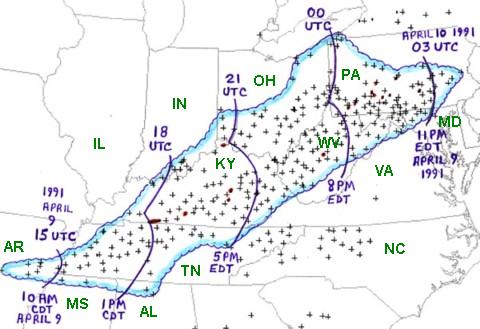APRIL 9, 1991
DERECHO
"The West Virginia Derecho of 1991"

Figure 1. Area affected by the April 9, 1991 derecho (outlined in blue). Curved purple lines represent approximate locations of gust front at three hourly intervals. "+" symbols indicate locations of wind damage or wind gusts above severe limits (measured or estimated at 58 mph or greater). Red dots and paths denote tornadoes.
On the morning of Tuesday, April 9, 1991, a bow echo formed over eastern Arkansas (AR) and began to produce wind damage. As the day progressed, a serial derecho developed as the original bow echo raced northeast and expanded in scale, while an additional bow echo formed farther north (Figure 1). Two people were killed and 145 were injured by this storm. Most of these casualties resulted from falling trees, flying debris, and mobile homes being overturned or destroyed. The most destructive damage extended from western Tennessee (TN) through Kentucky (KY) and West Virginia (WV) into western Maryland (MD) and southern Pennsylvania (PA). Winds along this band exceeded 80 to 100 mph at some points. Literally thousands of buildings and mobile homes were damaged or destroyed. In West Virginia alone there were insurance damage claims for 8000 homes and businesses. Over 200,000 West Virginia customers lost electrical power from the derecho. Flickering lights and power surges preceded the arrival of the storm, foretelling for many that something unusual was about to happen. The two deaths and 86 of the injuries occurred in West Virginia. It was the worst severe thunderstorm event in West Virginia since the tornadoes of the Super Outbreak of April 3, 1974.
John Hart, at the time a forecaster at the National Weather Service Charleston, West Virginia forecast office, was working when this event took place. The office was located near the airport, just northeast of the city and a few hundred feet above an extension of the Kanawha River Valley. As the bow echo rapidly approached the city around 6 p.m. EDT, John looked west to view the storm. It appeared as a "big black mass." Shortly before the gust front reached the office, he observed frequent bright blue flashes against the very dark background of the storm as winds short-circuited power lines. The gust front with its ragged low clouds and very heavy rainfall reached the office around the same time, with the rain blowing in nearly horizontal "sheets" as the airport anemometer registered a maximum wind gust of 66 mph. The severe winds lasted about 5 minutes, although the heavy rain continued for quite a while longer. As the derecho passed through the Charleston metropolitan area, one person was killed when a mobile home was overturned and rolled down an embankment. Sixty others were injured, mostly from flying debris and falling trees.
_____________________________________________________________________________
Additional information:
Duke and Rogash 1992
Storm Data, April 1991